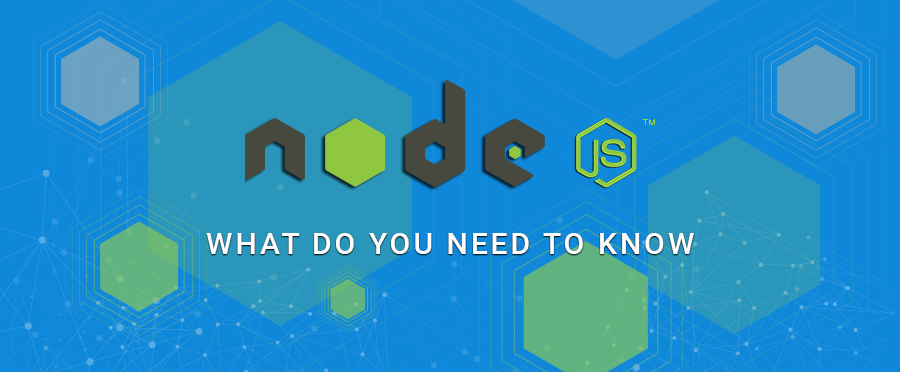Introduction
If you use JavaScript for your projects, then you must have heard of Node.js, one of the most prominent and powerful frameworks of JavaScript.
Since its release, Node.js has continued to be the most popular JavaScript framework among the developers community; even after the release of some other vibrant JS Frameworks such as React, Angular, Meteor and more.
Written initially by Ryan Dahl in 2009, Node.js was introduced about thirteen years after the introduction of the first server-side JavaScript environment, Netscape’s LiveWire Pro Web. The initial release of Node.js supported only Mac OS X and Linux.
So What is Node.js?
Built on Chrome’s V8 JavaScript engine, Node.js is a powerful framework that compiles the JavaScript directly into the native machine code.
An open-source and cross-platform JavaScript runtime environment, Node.js is a lightweight framework used for creating server-side web applications and extends JavaScript API to offer usual server-side functionalities.
Making use of packages and modules (like any other programming languages), it contain various functions and are imported from npm (node package manager) into our code and utilized in the programs.
A Node.js app is run in a single process, without creating a new thread for every request. It provides a set of asynchronous I/O primitives in its standard library, which prevent JavaScript code from blocking. Generally, libraries in Node.js are written using non-blocking paradigms, making blocking behavior the exception rather than the norm.
Node.js is used for large-scale application development, especially for data-intensive real-time applications, single page application, video streaming sites, and other web applications.
Let’s dig a little deeper into Node.js to better understand its benefits and usage.
Features of Node.js
Below are some of the key features of Node.js:
- Open Source
As mentioned earlier, Node.js is an open source framework MIT license, supported by a huge and pretty much community.
- Asynchronous
All the libraries of Node.js are asynchronous – meaning the Node.js based servers never wait for an API to send back the response and move on to the next API.
- Simple and Fast
Since Node.js is built on Google Chrome’s V8 JavaScript Engine, the libraries enable fast code execution, making it simple and speedy for developers.
- High Scalability
Node.js has the event mechanism, which makes it highly scalable and aids the server in a non-blocking response.
- No Buffering
Another key functionality of Node.js applications is that it never buffers any data.
- Single Threaded
Node.js is able to follow the single threaded model with the help of event looping – enabling a single program to handle multiple requests.
- Cross Platform
Node.js can be easily built and deployed on various platforms such as MAC, Windows, and Linux.
Node.js Architecture
Source: medium
Node.js uses Single Threaded Event Loop Model Architecture, which means that all the client requests on Node.js are executed on the same thread. However, not just single threaded, this architecture is event-driven as well. It helps Node.js in handling multiple clients concurrently.
Here’s a diagram, representing the Single Threaded Event Loop Model architecture.
Source: Medium/Edureka
The diagram clearly illustrates that the main event loop is single threaded whereas the I/O workers are executed on distinct threads. It basically accommodates the entire event loop where most of the Node.js API’s are designed to be asynchronous/non-blocking – ultimately reducing the server response time and increasing application throughput.
An Example Node.js Application
The most common example Hello World of Node.js is a web server:
Source: nodejs.dev
const http = require('http')
const hostname = '127.0.0.1'
const port = process.env.PORT
const server = http.createServer((req, res) => {
res.statusCode = 200
res.setHeader('Content-Type', 'text/plain')
res.end('Hello Garima!\n')
})
server.listen(port, hostname, () => {
console.log(`Server running at http://${hostname}:${port}/`)
})
Node.js Frameworks worth Checking Out
Node.js is a low-level platform, and to make things easier and more interesting for developers thousands of libraries were built upon Node.js. Many of those established over time as popular options. Here is a non-comprehensive list of the ones worth learning:
- AdonisJs: It’s a full-stack framework highly focused on developer ergonomics, stability and confidence. Adonis is one of the fastest Node.js web frameworks.
- Express: One of the simplest yet powerful ways to create a web server, Express provides minimalist approach, unopinionated, focused on the core features of a server.
- Koa: Built by the same team behind Express, aims to be even simpler and smaller, building on top of years of knowledge. The new project born out of the need to create incompatible changes without disrupting the existing community.
- Fastify: A web framework highly focused on providing the best developer experience with the least overhead and a powerful plugin architecture. Fastify is one of the fastest Node.js web frameworks.
- Hapi: A rich framework for building applications and services that enables developers to focus on writing reusable application logic instead of spending time building infrastructure.
- Micro: a very lightweight server to create asynchronous HTTP microservices.
- Meteor: an incredibly powerful full-stack framework, powering you with an isomorphic approach to building apps with JavaScript, sharing code on the client and the server. Once an off-the-shelf tool that provided everything, now integrates with frontend libs React, Vue and Angular. Can be used to create mobile apps as well.
- js: a framework to render server-side rendered React applications.
- Nx: power-ups to the Angular CLI which allows building full-stack applications using NestJS, Express, and Angular and easily share code between backends and frontends.
- NestJS: a TypeScript based progressive Node.js framework for building enterprise-grade efficient, reliable and scalable server-side applications.
- Socket.io: a real-time communication engine to build network applications.
If you want to build an app; web or mobile, get in touch with our team. We will help you build the best app for you and your business.


